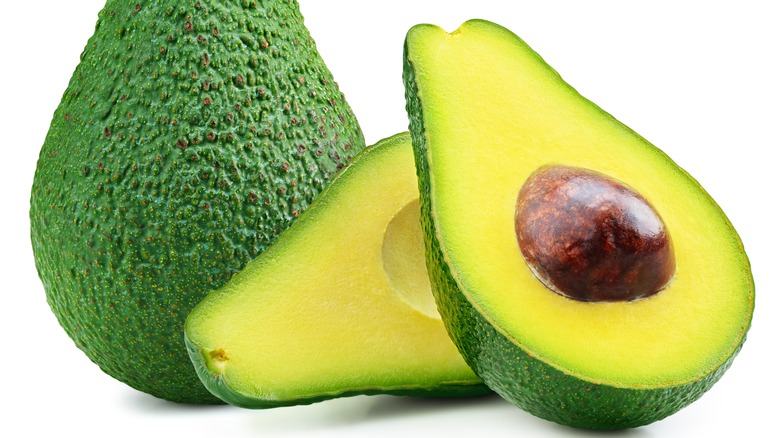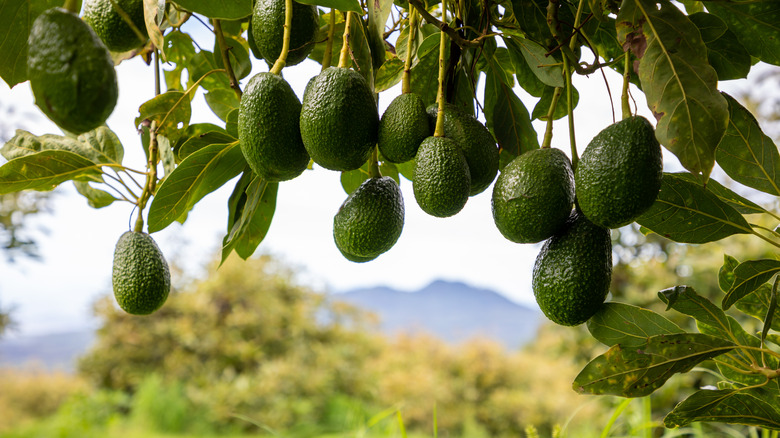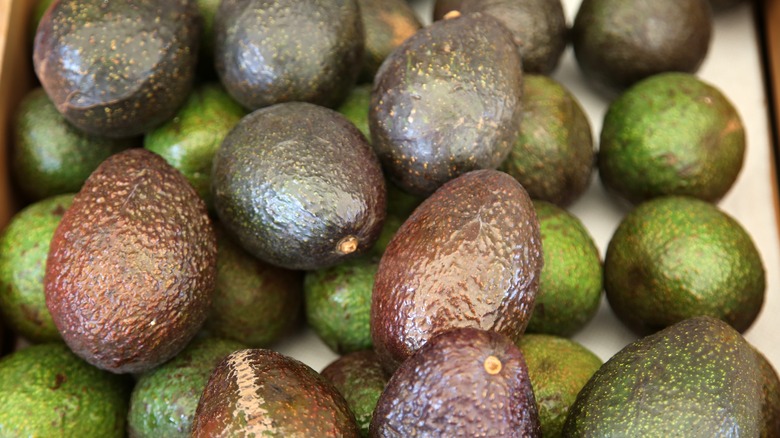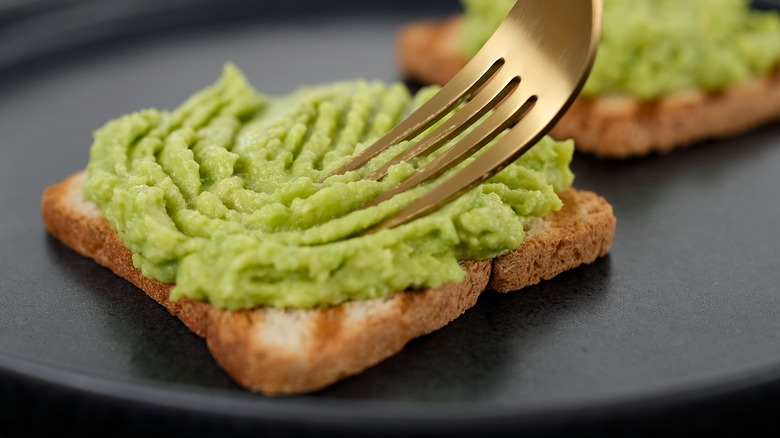Most Of The World's Avocados Come From This Country
Not only have avocados become popular in the U.S., but they've even become a symbol of the millennial generation, according to Newsweek. One of the trendiest ways to eat them is to mash them up, mix in a few seasonings, and slather them on toast. Millennials have proven they are willing to shell out more than a few bucks for avocado toast –- so much so that an Australian real estate agent advised them to stop ordering it if they ever hope to buy a house (per The Guardian).
But avocado toast isn't the only way these delicious fruits (yes, they're in the fruit family) are used. Avocados are often pressed into a cooking oil known for their high smoke point, mashed up into guacamole, and even added to margaritas at Disney World (via Grilled Cheese Social). Harry Potter even competes with avocados as a cherished millennial favorite, as his birthday, July 31, also happens to be National Avocado Day, noted by National Today.
Despite being often mistaken for a vegetable, this pop-culture foodie favorite is actually a berry. According to WebMD, avocados are characterized by their large pits, which make them fruit, and their thick, dark skin. While their popularity in the U.S. has exploded, they're not originally from here, and most of the avocados we see in grocery stores are shipped from a neighboring country.
Mexico dominates the avocado arena
Regarding avocado production, our neighbors to the south reign supreme. According to the Food and Agriculture Organization of the United Nations, Mexico produced over 2 million tons of avocados in 2020, more than twice the production of the second-place finisher, Colombia. In comparison, the U.S. only produced 187,433 tons of the fruit, which is certainly not enough to keep up with the American appetite. In 2020, Americans consumed a mind-boggling 2.7 billion pounds of avocados, quite an increase from the 436 million pounds we ate in 1985, according to Statista.
Guacamole aside, why is Mexico such a leader in the avocado (and avocado oil) arena? Just like California surfers, avocados prefer mild, warm climates and shudder at the thought of extreme temperatures, which generally gel with Mexico's climate. But some Mexican regions are more ideal than others. According to the Avocado Institute, the state of Michoacán is the only place in the world where avocados grow every day of the year due to its fertile volcanic soil, the optimal amount of rainfall, and varying elevation levels, which allow for multiple blooming seasons.
Unsurprisingly, Americans are heavily reliant on Mexico for our avocado fix. Produce Pay reports that 44% of the country's avocados are exported, with 85% of Michoacán avocados being sent to the U.S. annually.
Avocados are originally from Mexico
In addition to being the leader in avocado production, Mexicans can also proudly say they originally discovered the fruit for human consumption. Before avocados were even on peoples' radar, they were a travel snack for mammoths and other prehistoric animals, who would eat the fruit whole and spread its seed as waste while journeying long distances (via Smithsonian Mag). Who knew millenials are simply following in the footsteps of animals like giant ground sloths?
According to The Spruce Eats, the earliest known human record of avocado was in a 1696 catalog of Jamaican plants, where it was dubbed an "alligator pear tree." If you've ever seen an alligator's tough, scaly skin, you may see the resemblance to an avocado's outer layer. Avocados From Mexico reports that Puebla, in South Central Mexico, is the believed origin of avocados about 5,000 years ago, where Mesoamerican tribes consumed them and thought they had strength-giving powers.
When Spanish conquistadors came to Mexico, they decided to conquer avocados as well and changed the Aztec name to "aguacate," according to California Avocado. The Spanish brought them to Europe, although avocados didn't make their way to the U.S. until the 19th century. Babbel reports that California farmers were the ones to call them avocados, and the California Avocado Society began glamorizing the fruit by advertising it in The New Yorker and Vogue as a luxury salad ingredient.
Avocados are well-loved in America
According to Babbel, avocado farmers advertised guacamole in the '90s as a Super Bowl snack, which may have given the fruit's exposure. Once they caught on, avocados were quickly adopted by foodies, wellness bloggers, and celebrities alike, with mega-stars like Kim Kardashian and Miley Cyrus declaring their love for them (via AvoSeedo). Many creative ways to eat avocados came out of the woodwork — they were being made into fries, roses, and even popsicles (via NDTV Food). If you're dying to profess your love for avocados, you can find plenty of T-shirts, dresses, and other clothing items with sayings like "Avo nice day" and "You can't make everyone happy, you are not an avocado" (via RedBubble).
Luckily for everyone who loves avocados, they have plenty of health benefits. This can partly explain why they are so beloved — in addition to their buttery taste and texture, avocados are often seen as an indulgent, healthy food. According to WebMD, avocados are high in "good" fat and contain many vitamins and minerals, including potassium, vitamin C, and folate. They're a staple in the Mediterranean diet and contain heart-health-protecting cholesterol, according to UT Southwestern Medical Center. And for the majority of these benefits, we have Mexican avocado trees to thank.



